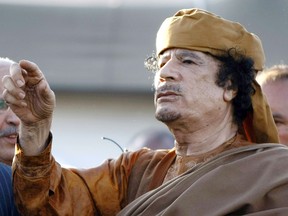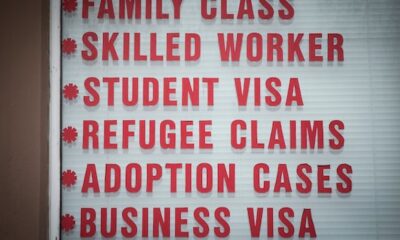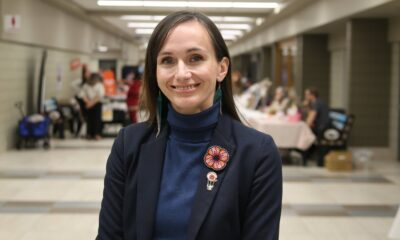World
Relative of Gaddafi Wins Chance to Remain in Canada After Appeal

A relative of former Libyan leader Muammar Gaddafi has been granted another opportunity to remain in Canada after contesting a previous immigration decision. Seraj Essaadi El Ferjani Ahmed, who has resided in Canada since 2017, argued that his connections to Gaddafi’s regime were deeper than initially assessed by immigration officials. Ahmed is reportedly the nephew of Mansour Daou, a prominent figure within Gaddafi’s inner circle, which complicates his case for refugee protection.
Ahmed arrived in Canada on a student visa to pursue aviation studies. Last year, he sought refugee status but was denied by Canada’s Immigration and Refugee Board (IRB), which concluded it was safe for him to return to Libya. The IRB stated that individuals with merely “a low-level association with the regime” would not face persecution, targeting only high-ranking officials and those with close ties to Gaddafi and his security forces.
However, Ahmed presented new evidence in his appeal to the Federal Court of Canada, demonstrating that his uncle, Daou, was significantly involved in Gaddafi’s security apparatus. Daou was identified as Gaddafi’s top security official during the 2011 uprising, a key player in the regime’s final days. The New York Times reported on Daou’s leadership of Gaddafi’s personal bodyguards and his proximity to the dictator during critical moments of the regime’s collapse.
In court, it was revealed that Ahmed had lived in Libya until the civil war forced him to flee in 2011, at the age of 16. He described fleeing with his family to Egypt after their home was targeted during the uprising. Ahmed’s family had sought refuge in Daou’s home before eventually leaving Libya. The timeline of events illustrates the chaos surrounding the regime’s downfall, which culminated in Gaddafi’s capture and death.
Court documents indicated that Ahmed had submitted a computer drive containing evidence of his uncle’s connections to Gaddafi, including photographs and a video of the attack on Daou’s residence. Despite these efforts, both the IRB and an internal appeal board rejected his claims, suggesting he had an alternative country of residence—Sudan—where his father was born. This conclusion was based on the belief that he did not face a credible threat if he returned to Libya.
On March 4, 2024, Judge Ekaterina Tsimberis ruled in Ahmed’s favor, criticizing the IRB for failing to adequately consider his evidence. She noted that the board’s assessment overlooked significant details regarding Ahmed’s family ties to the regime. Tsimberis ordered that Ahmed’s case be reviewed by an officer not previously involved in the matter, providing him with a renewed chance at asylum.
Ahmed’s lawyer, Gökhan Toy, contended that the IRB’s decision was based on selective evidence, which ultimately led to an unreasonable conclusion regarding Ahmed’s risk upon returning to Libya.
The case highlights the complexities involved in asylum claims, particularly those linked to politically sensitive backgrounds. As Canada continues to process refugee applications, the outcome of Ahmed’s case could set a precedent for others with similar ties to former regimes.
Ahmed’s ongoing legal battle reflects the broader challenges faced by individuals seeking refuge from their past connections, especially in cases linked to notorious figures like Gaddafi.
-

 Politics6 days ago
Politics6 days agoSecwepemc First Nation Seeks Aboriginal Title Over Kamloops Area
-

 World4 months ago
World4 months agoScientists Unearth Ancient Antarctic Ice to Unlock Climate Secrets
-

 Entertainment4 months ago
Entertainment4 months agoTrump and McCormick to Announce $70 Billion Energy Investments
-

 Lifestyle4 months ago
Lifestyle4 months agoTransLink Launches Food Truck Program to Boost Revenue in Vancouver
-

 Science4 months ago
Science4 months agoFour Astronauts Return to Earth After International Space Station Mission
-

 Technology3 months ago
Technology3 months agoApple Notes Enhances Functionality with Markdown Support in macOS 26
-

 Top Stories1 month ago
Top Stories1 month agoUrgent Update: Fatal Crash on Highway 99 Claims Life of Pitt Meadows Man
-

 Sports4 months ago
Sports4 months agoSearch Underway for Missing Hunter Amid Hokkaido Bear Emergency
-

 Politics3 months ago
Politics3 months agoUkrainian Tennis Star Elina Svitolina Faces Death Threats Online
-

 Politics4 months ago
Politics4 months agoCarney Engages First Nations Leaders at Development Law Summit
-

 Technology4 months ago
Technology4 months agoFrosthaven Launches Early Access on July 31, 2025
-

 Top Stories3 weeks ago
Top Stories3 weeks agoFamily Remembers Beverley Rowbotham 25 Years After Murder




















